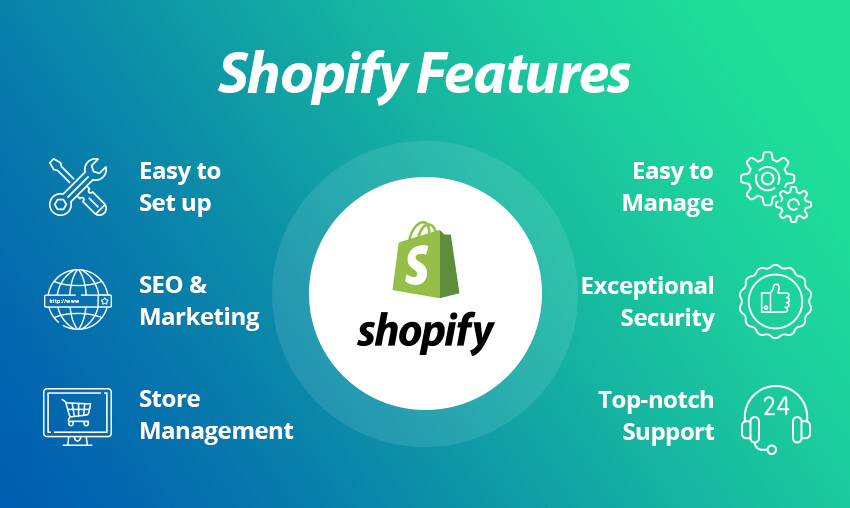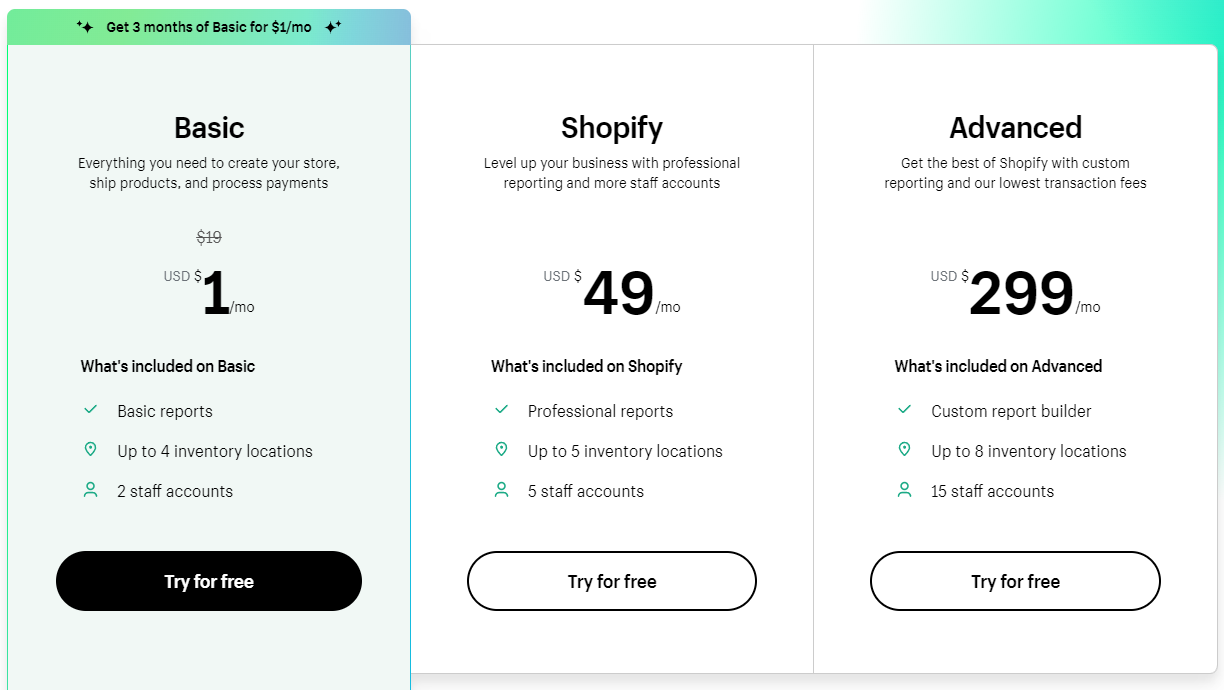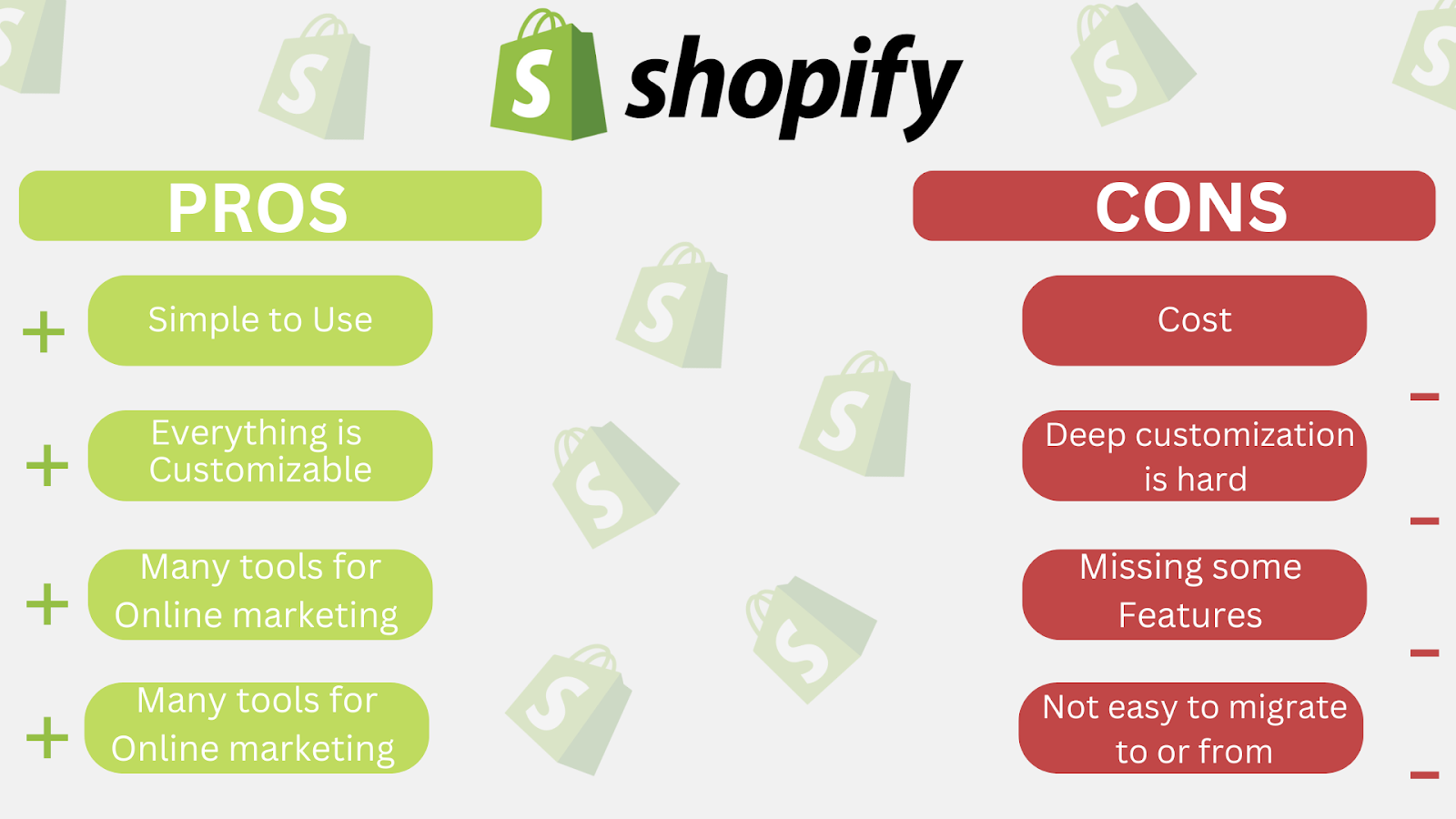
Shopify is one of the most popular eCommerce platforms out there for entrepreneurs who want to get their online stores up and running quickly. With Shopify, you don't need to be a tech whiz - setting up your store is as easy as one-two-three. All you need to do is choose the perfect template for your store, add your products, and start selling!
This convenience has seen Shopify become a go-to platform for entrepreneurs, with over 4 million stores currently up and running.1 But what exactly is Shopify, and how does it work?
We'll cover the following topics to help you better understand this popular eCommerce platform:
- What is Shopify?
- Why understanding Shopify is important
- How does Shopify work?
- How much does it cost?
- The pros and cons of Shopify
- How to know if Shopify is the choice for me
By the end of this guide, you'll have a better understanding of how Shopify works and if it's the right platform for your business.
So, let's dive right in and explore the world of Shopify!

What Is Shopify?
Shopify is a fully hosted cloud-based eCommerce platform that makes it easy to start, manage, and grow a business online. With Shopify, you can easily set up an online store in minutes and have access to powerful features like payment processing, inventory management, shipping and tax calculations. This means you don't have to worry about coding or designing a website from scratch - Shopify takes care of everything.
However, it's important to note that Shopify is a subscription-based eCommerce platform, so you'll need to pay a monthly fee to keep your store up and running.
Who Uses Shopify?
Shopify is a great solution for entrepreneurs and small business owners who want to start selling their products online. It's also suitable for experienced developers who want to create a fully custom-made store for their clients.
With a wide range of features and services, Shopify is used by many businesses - from small mom-and-pop stores to large multinationals.
Some notable brands using Shopify include Tesla Inc., Nestlé, Hyatt Hotels Corp, Kraft Heinz Co, Lindt & Sprüngli, and Red Bull GmbH.
However, it's important to note that Shopify has rules and restrictions regarding what products and services you can sell on the platform. Pharmaceutical products, weapons, solvents such as alcohol and gasoline, and tobacco are some of the prohibited items on Shopify.2

Why Understanding Shopify Is Important
As noted earlier, Shopify is one of the most popular eCommerce platforms on the market.
However, like many things, there are some myths that have been associated with Shopify, such as the idea that it's only for small businesses and limits your creativity. But this isn't true - Shopify is an incredibly powerful platform that can help you grow your business, regardless of its size. Also, it offers a variety of plans, features, and apps to help you customize your store according to your vision.
At the end of the day, it all comes down to understanding how Shopify works and what it can do for you. From setting up payment processing to marketing your products, Shopify offers a comprehensive suite of features for you to leverage. In addition, businesses can have an online presence quickly and easily without worrying about coding or technical aspects. This means you can focus on growing your business rather than worrying about the technicalities of running an online store.
With these insights in mind, it's clear that understanding Shopify is essential for businesses looking to start selling their products online. It can help make the process of setting up and managing an online store much easier, paving the way for success.
Replo offers additional Shopify support through our Library of customizable landing pages. This will save you a ton of time and effort, which otherwise would be spent setting up and customizing your own Shopify landing page!
How Does Shopify Work?
Shopify is a cloud-based platform that allows you to create an online store anywhere around the world by simply signing up for an account. Once your account is set up, you can leverage this platform to sell your products in the following ways:
Ecommerce Website To Sell Online
Shopify can be used to create an eCommerce website and start selling products online. It offers you the ability to set up a functioning website (which is hosted and includes your domain address), an inventory management system to track your products, and various features like discounts, shipping, and tax calculations. Within minutes, you can quickly create a fully functioning website and sell your products online.
Shopify POS (Point Of Sale)
Shopify offers a point-of-sale (POS) system, which helps you to sell products in-store. This system allows you to track inventory and sales, accept customer payments, and manage customer data. With this system, you can use a mobile device, such as a smartphone or tablet, to sell products in your retail store, pop-up shop, open markets, fairs, or events.
Ecommerce + POS Is An Option Too
Shopify also offers integration between an eCommerce website and a point-of-sale system. This allows you to manage inventory, sales, and customers in one system, making it easier to track data and make decisions. With this integration, you can sell both online and in-person. For example, you could use Shopify to sell products in your retail store as well as on your website.
Selling On Social Media Using Shopify
Shopify makes it possible to sell your products on social media with the help of a Buy Button. A buy button is a widget that you can add to your social media posts, allowing customers to purchase products without leaving the platform.
Buy Buttons can show product prices, descriptions, and even pictures.
Common social media platforms that you can sell your products leveraging Shopify include Instagram, Facebook, TikTok, WhatsApp, and Pinterest.
Omnichannel Selling
Shopify also offers an omnichannel selling approach that allows you to connect your Shopify store with various sales channels, such as Amazon, Etsy, and eBay. This allows you to sell your products across multiple channels, reaching more customers and increasing sales.
How Much Does It Cost?
As noted earlier, Shopify is a subscription-based platform that offers different plans for different needs. Below are the different subscription plans and the features included in each plan:
Starter ($5 per month): A storefront, Linkpop, contact page, checkout, and unlimited product pages.
Basic ($19 per month): Online store, 2 staff accounts, 24/7 support, unlimited products, and a POS.
Shopify ($49 per month): Online store, 5 staff accounts, 24/7 support, unlimited products, and a POS.
Advanced ($299 per month): Online store, 15 staff accounts, 24/7 support, unlimited products, and a POS.
Shopify Plus (from $2000 per month): Includes everything from the other plans, custom solutions, and VIP support.
Note: In addition to these features, Advanced, Shopify, and Basic plans support the recovery of abandoned carts, multiple sales channels, discount codes, and local payment methods.

How Much Do Beginners Make Using Shopify?
The amount of money you can make using Shopify depends on a variety of factors, such as the type of products you sell, how well you market them, and the pricing strategy you use.
Beginners typically start making anywhere from a few hundred to several thousand dollars a month, but with the right strategies, experienced Shopify users have made millions.
According to a survey conducted in September 2022, Shopify's average revenue per customer was $92.3 This shows that you can make good money with Shopify with the right strategy and a little effort.
The Pros and Cons Of Shopify
Shopify is a great platform for starting an online business, but it also has its pros and cons. Here are some pros and cons of using Shopify:
Pros
Easy To Use
Shopify platform is easy to use, and you can get your store up and running in as little as a few hours. Built for the average person, the platform is straightforward and requires little technical knowledge for you to use it.
Mobile-Friendly Designs For Your Online Store
Shopify offers a variety of mobile-friendly templates, which you can customize to your specific needs. In addition, the platform is optimized for all devices and screen sizes, so your customers can easily access your store from any device.
Excellent Shopify Support
Shopify provides you with 24/7 customer support through live chats, emails, or phone calls. In addition, Shopify has a help center where you can find answers to your questions. This is a great solution if you're new to eCommerce and need assistance setting up your store.
Ability To Use Your Own Domain Name
With Shopify, you can use your domain name instead of the default ".myshopify.com" extension, which can help improve your brand's visibility and credibility in search engines.
Social Media Integration
Another great feature of Shopify is that it allows you to integrate with social media platforms. You can easily share your product page directly on social media platforms (Facebook, LinkedIn, Pinterest, and Reddit) from your Shopify admin.
Plugins
Several useful plugins are available for Shopify to help you build and grow your store. You can use plugins to increase customer satisfaction, collect more leads, and increase sales.
Built-In Payment Tools
Shopify comes with built-in payment tools, so you can get started quickly without having to invest in separate payment applications or software. With Shopify's "Shopify Payments," you can enjoy quick payouts, lower transaction fees, and no setup or maintenance costs.
SEO Marketing Tools
Shopify online stores have built-in SEO marketing tools that help optimize your content. For example, canonical tags are automatically added to your pages to help prevent duplication of content in search results.
Abandoned Cart Notifications
One important feature of Shopify is that it allows you to recover your customers' abandoned carts. Shopify allows you to set up automatic notifications that get sent to your customers if they leave their checkout before completing a purchase. This helps you recover lost sales and build better relationships with your customers.
Cons
Theme Customization Challenges
Shopify themes tend to be basic, and adding more advanced features can be challenging. Not only does it require some coding skills but also additional payment if you're looking to add customizations to your themes.
Transaction Fees
Shopify charges transaction fees on all debit and credit card transactions if you opt not to use their "Shopify Payments." This can add up to a significant amount if you're running a large business. Additionally, the transaction fees can add up if your sales volume is small.
Expensive Add-Ons
Shopify charges a monthly fee for its platform, but there are additional costs to consider with building an online store. For example, the Shopify App Store contains many "apps" (add-on plugins) that can help you add more functionality to your store. But many apps aren't free, and some can get expensive. If you add two or three apps to your store, this can quickly double the monthly cost of Shopify.
Content Management Issues
Shopify is built for eCommerce and not really for content. This is especially evident when it comes to front-end management. Shopify can be a bit limiting compared to other purpose-built content management system (CMS) platforms if you have a content-heavy site that features many articles and blog posts.

How To Know If Shopify Is The Choice For Me
Shopify is a great choice for businesses looking to set up their first eCommerce store. It's intuitive and easy to use, and has many useful features to help you get started quickly. But it's not the best choice if you're looking for a more advanced solution with specific needs that Shopify can't meet.
For example, suppose your business plans to add features like advanced product options, or you need a platform designed specifically for content management. In that case, Shopify might not be the best choice.
However, if you're not sure whether Shopify is right for you, take a look at their 3 days free trial offer. Before diving into a paid plan, you can test out the features and see how well it meets your needs.
Final Thoughts
Shopify is a great choice for businesses looking to set up their first eCommerce store. It's intuitive, easy to use, and comes with many useful tools to help you get started quickly. Its few drawbacks, such as the high cost of add-ons and difficulty in customization, can be offset by its many benefits.
If you're looking to set up your first online store, then Shopify is the perfect choice for you!
Additionally, if you need assistance taking your Shopify store to the next level, consider working with Replo! We offer pre-built Shopify landing pages that are built specifically to increase conversions and boost sales. With Replo, you can easily grow your business online.
Schedule a demo today to learn more!
Sources:
- Shopify usage statistics. (n.d.). Retrieved from https://trends.builtwith.com/shop/Shopify
- Shopify acceptable use policy. Shopify. (n.d.). Retrieved from https://www.shopify.com/legal/aup
- Littledata. (n.d.). Retrieved from https://www.littledata.io/average/revenue-per-customer/Shopify